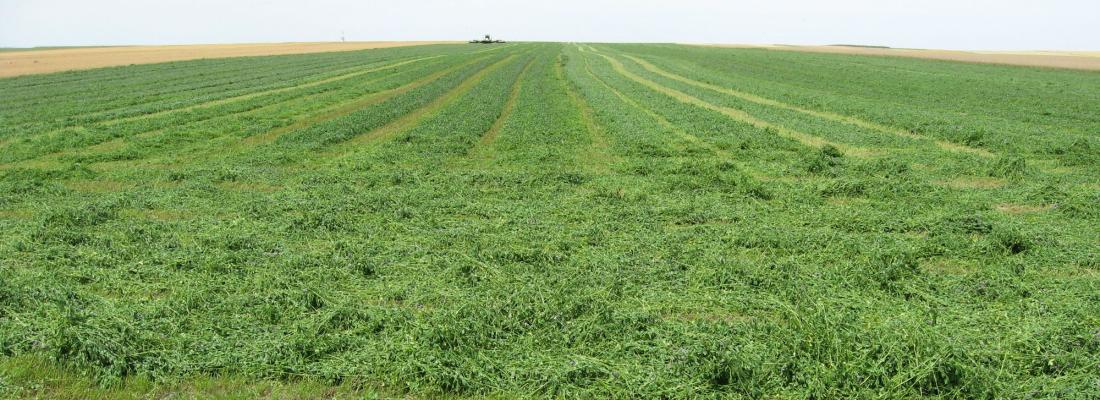France
October 24, 2024
Enhancing the competitiveness and sustainability of the European legume breeding activities and output is the goal of the BELIS innovation project launched in October 2023. The project's key objectives are to develop cost-effective breeding tools, improve the economic and regulatory environment for legume breeding, and ensure efficient innovation transfer through a collaborative platform for public private partnership.
 © INRAE - Pascal THIEBEAU
© INRAE - Pascal THIEBEAU
BELIS project has its annual meeting from 17-19 sept at the premises of Flemish research partner ILVO in Melle, near Ghent, Belgium. The meeting is gathering together all the project partners to present advancements achieved so far, to plan for next activities and to reflect on some of the key avenues for improving and innovating in legume breeding.
A unified approach to legume breeding
Legumes, both for grain and forage production, play a crucial role in agriculture by providing essential proteins for human and animal consumption and offering environmental benefits mostly related to symbiotic nitrogen fixation. Despite their potential, legume cultivation in Europe has been limited due to a lack of high-yielding and resilient varieties, resulting in a high import rate for legume crops into Europe. BELIS aims to bridge the gap by leveraging advanced breeding methodologies and fostering collaboration among research and industry stakeholders.
The European Union's Horizon Europe program launched this ambitious project, ‘Breeding European Legumes for Increased Sustainability’, in October 2023, to build a firm base for the legume breeding community in research and industry across Europe. With a consortium of 34 partners from 18 countries, including research institutes, plant breeders, seed companies, registration offices and advisory services, BELIS is poised to tackle some of the most pressing challenges in legume breeding research and varieties production. A high focus is placed on delivering knowledge and information on innovative breeding tools, new experimental germplasm and improved varieties to all actors in the value chain (farmers, seed, food and feed industry) as well as describing, evaluating and developing business and cooperation models to get these innovations and finally release new varieties to reach the farms and further value chain steps.
Overall, the project is focusing on seven forage crops (red, white and annual clovers, lucerne, sainfoin, birdsfoot trefoil and vetches) and seven grain crops (pea, faba bean, soybean, white lupin, lentil, chickpea and common bean) representing a major part of the diversity of legume species cultivated in Europe.
BELIS project should eventually help in improving breeding methodologies and enhancing the resilience of legume crops.
Innovative research and breeding techniques to enhance genetic progress
BELIS is at the forefront of integrating cutting-edge technologies into legume breeding for optimizing the genetic progress to get to new varieties. For instance, the project is implementing drone technology in red clover breeding programs. The drones help to predict flower head numbers and biomass, critical for seed and forage yield. In another experiment, 300 Vicia accessions were phenotyped with spectral cameras, analyzing various stress responses and plant health indicators, setting the stage for high-throughput analysis.
Other studies include the identification and validation of genetic markers associated with agronomic traits. Phenotypic traits and molecular markers are to be used in experimental breeding programs to provide proof of concept for new tools and methods that will help breeders to advance in their own activities to release better adapted varieties more efficiently. In grain legumes, for example faba bean, BELIS is working on near Infrared Spectroscopy (NIRs) calibration models for quality traits and validating markers linked to important target traits such as drought, yield, and broomrape resistance. Or in soybean, breeding trials are being prepared, also focusing on traits such as grain yield, quality, and drought tolerance, and the main phenotyping trials are set to begin in 2025.
Improving variety testing and registration
BELIS will also provide innovations and ideas on other aspects of the legume varieties adaptation and availability for farmers beyond genetics, such as designing cross country tests and unifying criteria of the official variety testing systems for providing farmers with more useful information on the seeds value for cultivation and use (= VCU) at their own sites. Finally, it is expected that the project proposes useful tools and improvements to the official systems of variety registration, to make then more effective and reduce its cost and time requirements.
Organization and cooperation of legume breeding actors
New ideas to improve the organization and cooperation models for legume research and breeding will be proposed and analyzed through case studies run in different countries, trying to discern collaborative ways for different actors to complement research and development efforts and to better achieve varieties release to the market and boost the availability of adapted legume seeds for farmers.
Network and stakeholders’ collaboration
BELIS emphasizes the importance of collaboration and knowledge exchange. The project is creating a network that brings together public and private breeders, researchers, extension services, registration offices, and the seed, food, and feed industries. This network will aim to facilitate business collaborations, technical training, and policy advocacy to support legume breeding activities.
A promising future for European legumes
The BELIS project is a significant step towards increasing Europe's protein autonomy, reducing dependency on imported proteins, and promoting sustainable agricultural practices. By enhancing genetic progress and making improved legume varieties available to farmers, BELIS is paving the way for a more resilient and productive agricultural sector.
Farmers, researchers, and policymakers are encouraged to join the BELIS network, stay informed about the project's progress, and contribute to shaping the future of legume breeding in Europe.
For more information, visit the BELIS website and subscribe to the BELIS newsletter

The BELIS project has received funding from the Horizon Europe research and innovation programme under the Grant Agreement N°101081878